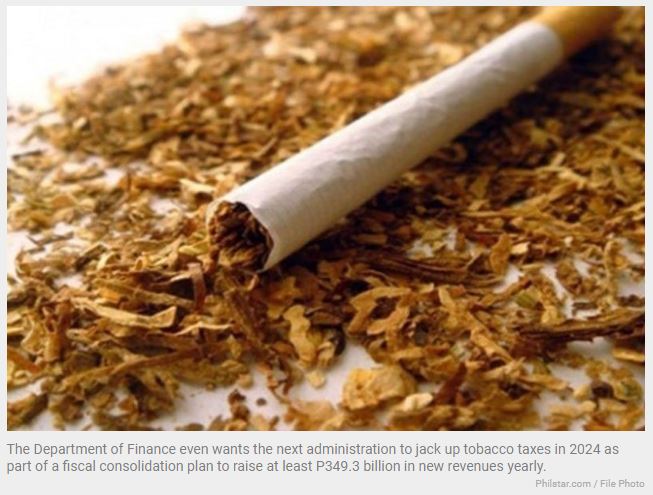Easing COVID-19 curbs reignite illicit cigarette trade in Philippines
MANILA, Philippines —Tobacco officials understand why the government targets the industry every time it needs extra cash. They said cigarettes are viewed as low-hanging fruits that can be picked any time. After all, taxing tobacco feels fair and just due to its proven damage to public health.
The Department of Finance even wants the next administration to jack up tobacco taxes in 2024 as part of a fiscal consolidation plan to raise at least P349.3 billion in new revenues yearly.
The tax reform on harmful products like cigarettes and e-cigarettes can contribute P91.4 billion in incremental collection that the government can allocate for debt payments.
However, a 2019 study by the EU-ASEAN Business Council reported that the Philippines loses $213.4 million – more than P11 billion – to tobacco smuggling. The paper estimates that roughly eight billion sticks circulate every year and authorities miss out on the opportunity to tax them due to the lack of intelligence work.
The study flagged the region’s resistance to signing the Protocol to Eliminate Illicit Trade in Tobacco Products. The multilateral treaty requires parties to share information and pursue collaborations to toughen operations against cigarette smuggling.
By plugging the tax leakage from the illicit trade of tobacco, the paper said governments can cut the borrowings they make to cover for their budget gap – a development that can push up the credit ratings of an economy in the long term.
“Correcting the regulatory and economic circumstances that enable illicit trade also can improve sovereign credit ratings, thereby, reducing the cost of borrowings and enabling governments to raise capital in the international financial market, stimulating long-term investments and growth,” the study said.
Even PBA party-list Rep. Jericho Nograles said that the government would only widen its revenue losses if it raises tobacco taxes without improving border defenses and tax administration.
Nograles headed the technical working groups on agricultural smuggling and illicit tobacco that was tasked by the House ways and means committee to assess the impact of the illegal trade of farm goods. They found out that the government forfeits up to P60 billion every year on tobacco smuggling alone.
“As to the proposal of raising taxes on cigarettes, you will give smugglers additional incentive to intensify their illicit trade. The government has to look at the revenue losses owing to the lack of proper policing and [weakness in] border defenses,” Nograles told The STAR.
As a recommendation, Nograles said the next Congress should amend Republic Act 10845, or the Anti-Agricultural Smuggling Act of 2016, to add cigarettes among the products that constitute the crime of economic sabotage when smuggled at a market value of P1 million and above.
Under the law, any person found guilty of large-scale agricultural smuggling is sentenced to life imprisonment and penalized twice the fair value of the apprehended products.
At present, the unlawful possession of excisable imports like cigarettes with a market value of at least P1 million is sanctioned by up to P20 million in fine and a maximum of 12 years in jail.
Last week the Bureau of Customs in the Port of Limay seized from a resort and a store a total of 487 master cases of contraband cigarettes worth P10 million. If the suspects were charged with economic sabotage, they could end up paying more than P20 million in fine and spend the rest of their lives behind bars.
On the other hand, a source involved in intelligence work on tobacco smuggling said authorities should tighten their monitoring in areas around Mindanao. According to the source, the share of illicit brands in the cigarette market in Mindanao can go up to as high as 60 percent.
“They have to look into the impact of what they are seizing. Likewise, they must work together, the Bureau of Internal Revenue, the Bureau of Customs, the Philippine National Police and the National Bureau of Investigation. In Mindanao, smugglers just roam around and yet they are let free,” the source told The STAR.
“Now if the government raises taxes, the smugglers will be happy. The more you raise taxes, the more margins for them. No one wins in tax hikes,” the source said.
The source compared the proposed hike in tobacco taxes to shooting oneself in the foot, saying it will only push the retail prices of authentic cigarettes up and drive smokers to shift to illicit for their cheap cost.
At the end of the day, the objective of raising revenues fails and the smugglers end up winning. Nograles warned that tobacco makers may pack up their operations here if retail margins further widen between the authentic and illicit brands.
“If you increase taxes to eliminate the cigarette industry, tobacco firms may leave the country. In that case, you will just create a problem of unemployment in the agriculture and manufacturing sectors. Remember, the tax on cigarettes is placed at P55 per pack this year; some illicit brands sell at P38 per pack. Margins are widening for the makers of genuine,” Nograles said.
Based on data, roughly 2.18 million Filipinos nationwide depend their livelihoods on the tobacco industry: 462,504 at the production level, 24,610 at the trading segment, 5,550 at the production bracket, 1.68 million at local markets and 2,415 within the public sector.
Although the unemployment rate declined to 5.8 percent in March, it has yet to revert to the pre-pandemic level of 5.3 percent in January 2020.
Tobacco officials are preparing for a challenging stretch in the next three years, anticipating both the executive and legislative branches to target the industry in the name of fiscal consolidation.
Whether tobacco will be taxed to the max is up to the next administration, but cigarette makers, on their end, vowed to protect the interest of their industry and its 2.18 million dependents.
Source: https://www.philstar.com/business/2022/06/16/2188609/easing-covid-19-curbs-reignite-illicit-cigarette-trade-philippines-


 English
English




